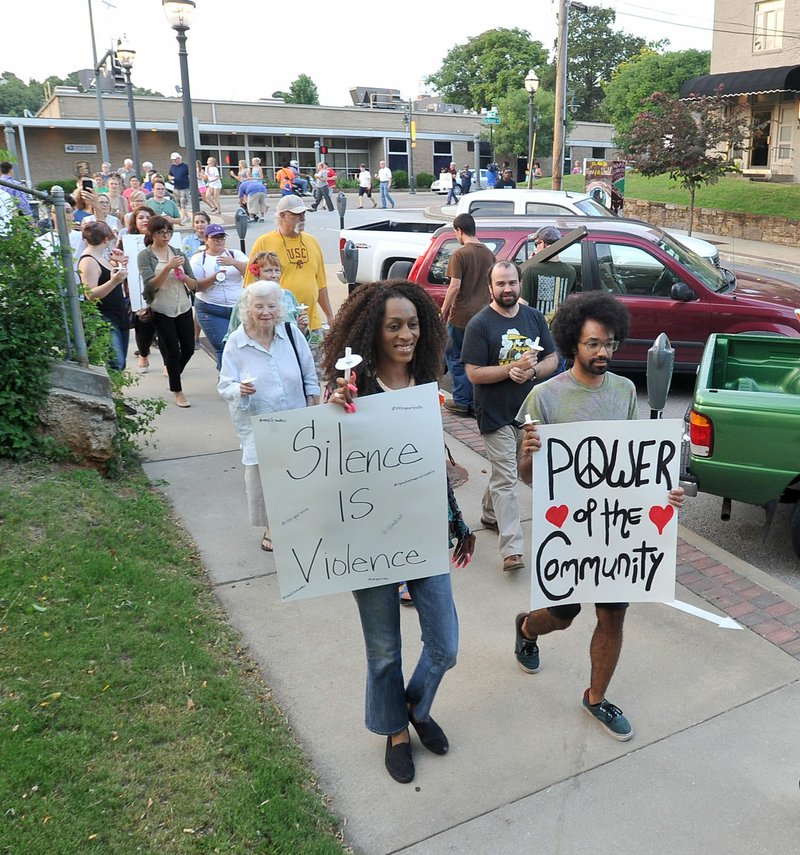FAYETTEVILLE -- Black lives matter as much as any other, hundreds of Northwest Arkansas residents said together Wednesday evening as the debate over police use of force against black people continued to seethe across the country.
About 200 people gathered for a march through downtown Fayetteville marking the first anniversary of the death of Sandra Bland, a black woman who died in a Texas jail after failing to signal a lane change. They came to grieve, to pray for unity and to protest, ending at the Fayetteville Police Station by reading of dozens of names of black people killed by police or others while going about their everyday lives.
"We march, and then what? We scream, and then what?" Jazmynne Matthews, a black transgender performer and advocate, called out during a vigil at St. Paul's Episcopal Church before the march. "It's time for change. Unite and change, make it happen. It's not going to happen unless we make it happen. That is the what."
A year after Bland's death, which was ruled a suicide despite critics' skepticism, the issue of police officers' treatment of people of color remains relevant. The fatal police shootings of Philando Castile in Minnesota and Alton Sterling in Louisiana last week sparked protests across the country, including one in Dallas that dissolved into chaos when a black man shot and killed five police officers.
Lowell Grisham, the church's rector, offered a prayer for equality for all, for the black and police victims and for all humanity. One month previously, his church also held a vigil after the shooting deaths of 49 people in Orlando, Fla.
"Break down the walls that separate us," Grisham said. "Unite us in the bonds of love."
Last week's deaths were just the latest in a series of deaths that include the 2014 police shooting of 12-year-old Tamir Rice in Ohio, the shooting of 17-year-old Trayvon Martin in Florida and other high-profile cases.
The list of names read at the march's end included Amadou Diallo, a dark-skinned Guinean who was shot 19 times by New York City Police in 1999 after reaching for his wallet. The case is taught in psychology courses around the country as an example of how even subconscious, split-second prejudice can be deadly.
The names also included Willie Tillman, who police said was killed during an altercation following a traffic stop earlier this year when he reached for an officer's gun. A police and Washington County Sheriff's Office investigation found the shooting was justified.
"I am unbreakable, but to let this continue would be unbearable," said Jared Carter, co-founder of Hands Up NWA, adding later he felt he could easily be in the same situation as Bland or the others. "I am a man, a person, a human being."
The march came a day after the first of many planned meetings between Fayetteville Police, the Northwest Arkansas Democratic Black Caucus and a group called Not in my City Fayetteville, which hopes to start an ongoing conversation between officers and black residents.
"We've got to make sure that diversity and inclusion is more than just a notion, that we act it," D'Andre Jones, president of the caucus, said Tuesday. "We see the opportunity for Fayetteville to be the model community in Arkansas and in the country."
A lifetime of subtle or blatant racism can teach black people to fear or distrust police officers, who might then respond in kind, Jones said. The groups can teach each other their experiences and get to know each other, heading off tension and potential violence, he said.
In a Facebook post Tuesday, Police Chief Greg Tabor outlined extensive training Fayetteville Police receive on the use of force, de-escalating situations, diversity and preventing bias in policing. The department works with several community groups to build trust, he said.
"It's about building those bridges in the community and getting to understand each other," Sgt. Craig Stout said Wednesday, adding Not in my City volunteered to help with the National Night Out event in August.
NW News on 07/14/2016
